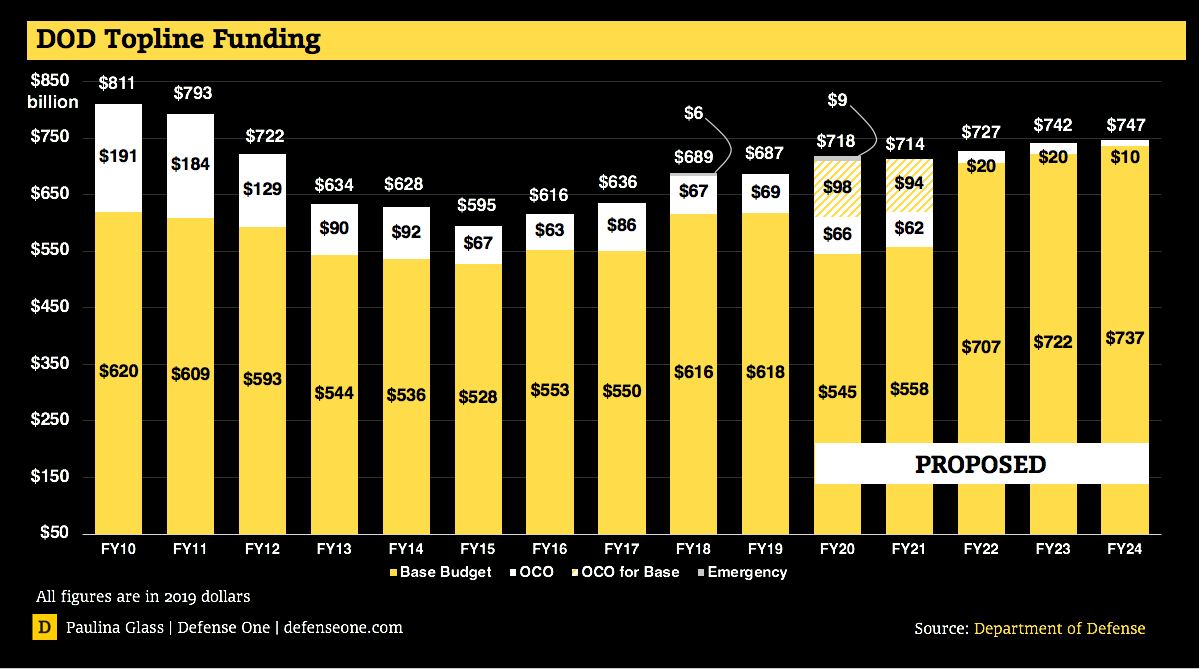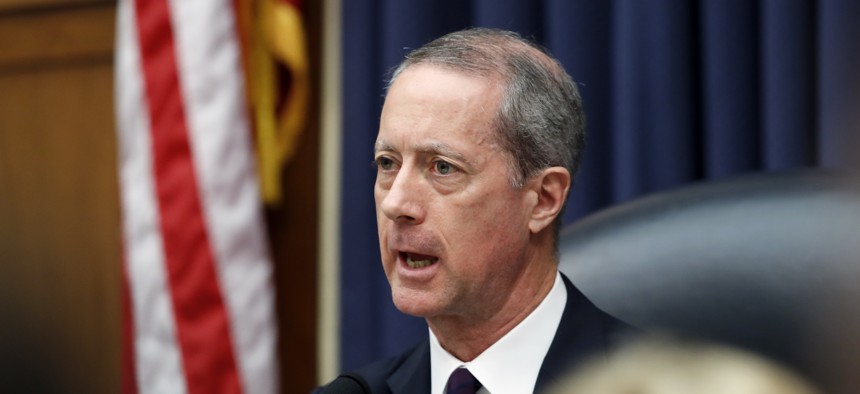Lawmakers Question Pentagon’s Use of ‘Slush Fund’ to Skirt Budget Caps
Almost one-quarter of the 2020 defense budget is in OCO. That's sure to come up when Acting Defense Secretary Patrick Shanahan testifies on Thursday.
Nearly one-quarter of the Pentagon’s 2020 budget request would come through an account intended to fund unexpected overseas operations, a fiscal maneuver expected to be the most hotly debated item in upcoming congressional debate.
Pentagon officials said the White House ordered the maneuver, which allows the $750 billion request to skirt a law capping the defense budget at $576 billion. Some $164.6 billion of the total would flow through the Overseas Contingency Operations account, which is exempt from the caps.
If approved, the OCO request would include:
- $97.9 billion for items that the Pentagon would typically include in its base budget.
- $25.4 billion for war efforts in Afghanistan, Iraq, and Syria.
- $41.3 billion for “Enduring in-theater and [stateside] costs that will remain after combat operations end.”
There's also a $9.2 billion fund for “emergency requirements,” such as fixing bases damaged by hurricanes and sections of the wall President Trump wants to build on the U.S. border with Mexico.
The proposal is deeply controversial on Capitol Hill, where both Democrats and Republicans have described it as a “slush fund” designed to skirt budget caps. (Another person who has used the term is Mick Mulvaney, who led the construction of this 2020 budget request as director of the Office of Management and the Budget and acting White House chief of staff. Mulvaney was a leading foe of OCO while a member of the House during the Obama administration.)
On Monday, House Appropriations chairwoman Nita Lowey, D-N.Y., called it “a massive budgetary gimmick to hide the true cost of this defense spending request.”
Rep. Mac Thornberry, Texas, the top Republican on the House Armed Services Committee, suggested on Tuesday afternoon that the hefty OCO account will be “dismissed” on the Hill.
“I don’t think this was the Pentagon’s idea,” Thornberry told reporters. “It makes the administration, or at least OMB, less relevant in how that defense portion is constructed because everybody knows Congress would never agree to this giant OCO increase on its own.

“I have to confess, the reasoning behind doing it that way is not clear to me,” he added.
The use of OCO, and the dramatic increase in the defense budget overall, does have one powerful ally on the Hill: Senate Armed Services Chairman Jim Inhofe, R-Okla. A staunch ally of the president, Inhofe said in a brief interview that “I’m for doing whatever is necessary to get to the 750,” referring to the administration’s topline $750 billion budget request. Inhofe blamed opposition to the idea of using OCO largely on House Democrats — Thornberry and others notwithstanding.
“If it's necessary to use OCO for the purpose of getting what we know we have to have for our budget, then I would be for doing it,” Inhofe said. “I know that it's set up for a different purpose and there's a lot of opposition, but if you look at the opposition, a lot of the opposition comes from [House Armed Services chair Adam Smith, D-Wash.] and some of the liberal Democrats that are in control over in the House.”
Inhofe said last year that he sees his role as SASC chair as getting Pentagon leaders all the money they want: “I try not to get into debates with people on the threat that they view. What I can do is say, okay, if that threat is correct, these are the resources we need.”
While briefing reporters on Tuesday, acting Defense Department Comptroller Elaine McCusker blamed OMB for the heavy reliance on OCO.
“From our perspective, we built a budget that is required to carry out the National Defense Strategy,” McCusker said. “The decision on how to best finance that budget was made by OMB and something that we followed their direction on.”
McCusker also argued that the OCO budget receives just as much scrutiny and oversight from OMB and Congress as the Pentagon’s so-called base budget. She promised “a significant amount of transparency” to lawmakers.
“Congress will have everything that it needs to do its analysis and understand what we've done and why with our OCO budget,” she said.
Perhaps the biggest sticking point of the $9.2 billion “emergency budget request” will be $3.6 billion to extend barriers on America’s southern border and another $3.6 billion to backfill any military construction projects put on hold to build such walls. Democrats, led by House Speaker Nancy Pelosi, D-Calif., have cast the Trump’s signature campaign promise as “immoral.” Even some Republicans who broadly support building more barriers along the U.S.-Mexico border are uncomfortable with the use of military funds to do so.
“I’m for building a wall—physical barriers can contribute to border security—but I think it ought to be funded on its own,” Thornberry said. “So don’t take the wall money out of the minimum you need for defense, is where I am.”
The Senate is also poised to vote on an embarrassing resolution overturning Trump’s declaration of emergency to build the wall. Acting Defense Secretary Patrick Shanahan is scheduled to testify before the Senate Armed Services Committee on Thursday.



